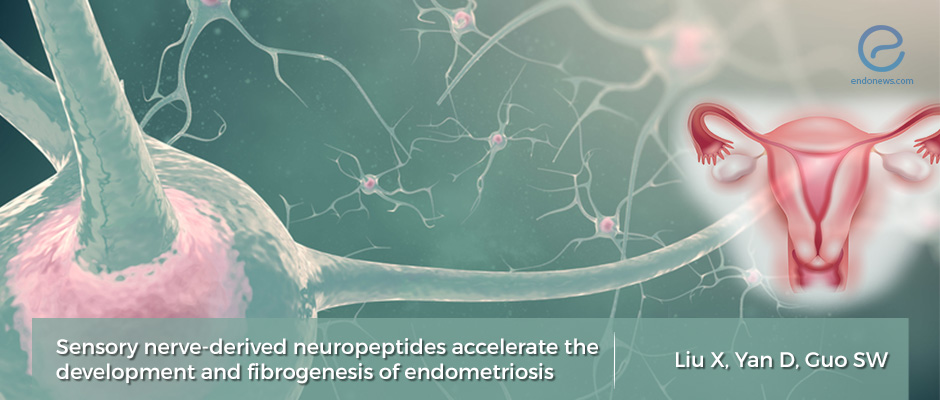Fibrogenesis in endometriosis: The role of neuropeptides
May 23, 2019
Do sensory nerves play any role in endometriosis?
Key Points
Highlight:
- Dr. Guo group from Fudan University, Shanghai, China, found that sensory nerves participate in all major steps in the development and fibrogenesis of endometriotic lesions.
Importance:
- Endometriotic lesions are known to be hyperinnervated due to neurogenesis resulting from neutrophins secreted by endometriosis lesions and possibly platelets.
- These neutrophins seem to preferentially favor the production of sensory neurons at the expense of sympathetic neurons.
- The histological relationship between nerves and the extent of fibrosis raises the possibility that sensory nerves may facilitate the development and fibrogenesis of endometriosis.
- Sensory denervation may decelerate the development and fibrogenesis of endometriosis. In particular, sensory nerve-derived substance P (SP) and its receptor, neurokinin receptor 1 (NK1R), may facilitate those endometriosis-related processes.
What`s Done Here:
- In the first experiment using chemical denervation in both sympathetic and sensory nerves, sensory denervation resulted in significantly improved hyperalgesia as compared with controls.
- In experiment 2, surgical denervation before or after induction of endometriosis also decelerated the development of endometriosis.
- In the last experiment, the authors found that NK1R activation by Substance P infusion accelerated lesional development. On the other hand, NK1R antagonism decelerated lesional development and improved hyperalgesia.
- This suggests that sensory nerves or the NK1R signaling pathway may be potential targets endometriosis treatment.
Conclusions:
- Sensory nerves participate in all major in the development and fibrogenesis of endometriotic lesions, such as steps epithelial-mesenchymal transition, fibroblast-to-myofibroblast transdifferentiation and smooth muscle metaplasia.
- However, more molecular data will need to confirm this finding in the future.
Lay Summary
Endometriosis is a debilitating gynaecologic disease affecting 6–10% of women of reproductive age. Endometriotic lesions are known to be hyperinnervated due to neurogenesis resulting from neutrophins secreted by endometriotic lesions and possibly platelets. These neutrophins seem to preferentially favor the production of sensory neurons at the expense of sympathetic neurons.
The striking histological relationship between nerves and the extent of fibrosis in the endometriosis lesions raise the possibility that nerves, especially sensory nerves, may facilitate the development and fibrogenesis of endometriosis. In this study, Dr.Guo group from Fudan University in China hypothesized that sensory denervation may decelerate the development and fibrogenesis of endometriosis. In particular, sensory nerve-derived substance P (SP) and its receptor, neurokinin receptor 1 (NK1R), may facilitate those endometriosis-related processes. This paper was recently published in the journal “Human Reproduction”.
To understand the role of sensory nerves in the development of endometriosis, this group performed three independent in vivo experiments. In experiment 1, they performed chemical denervation in both sympathetic and sensory nerves. Sensory denervation resulted in significantly improved hyperalgesia as compared with controls. In contrast, sympathetic denervation yielded only transient improvement in hyperalgesia. In experiment 2, surgical denervation before or after induction of endometriosis also decelerated the development of endometriosis. In the last experiment, the authors found that NK1R activation by Substance P infusion accelerated lesional development. On the other hand, NK1R antagonism decelerated lesional development and improved hyperalgesia. This suggests that sensory nerves or the NK1R signaling pathway may be potential targets endometriosis treatment.
The authors have shown that sensory nerves participate in all major in the development and fibrogenesis of endometriotic lesions, such as steps epithelial-mesenchymal transition, fibroblast-to-myofibroblast transdifferentiation and smooth muscle metaplasia. However, more molecular data will need to confirm this finding in the future.
"Our study demonstrates that sensory nerves are likely an active accessory to endometriotic cells to accelerate lesional development in addition to their traditionally perceived roles as pain transducers. Sensory nerves are yet another unindicted culprit in the development of endometriosis, and, as such, NK1R may be an admissible drug target for treating endometriosis" the authors added.
Research Source: https://www.ncbi.nlm.nih.gov/pubmed/30689856
Denervation Endometriosis Fibrogenesis NK1R Sensory nerve Substance P

